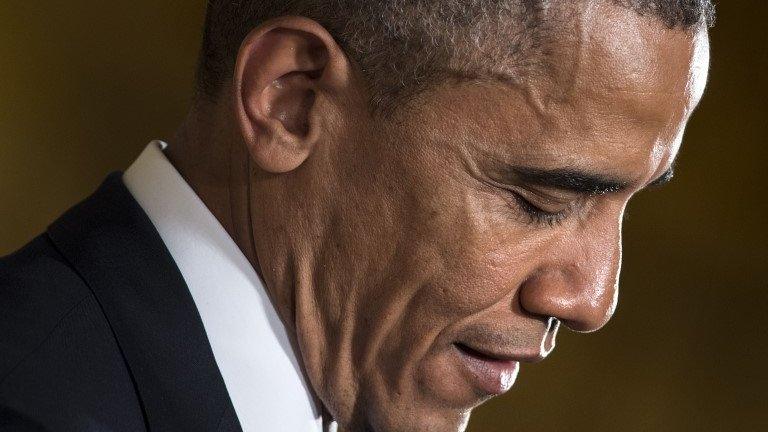Net neutrality set to be defended by US regulator
- Published
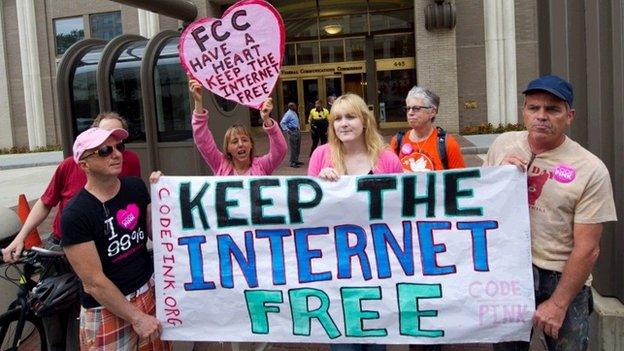
Hints that the FCC was considering allowing "fast lanes" for some internet traffic caused protests
The chairman of the US's communications watchdog is proposing "strong" protections to ensure the principles of net neutrality are upheld.
In an article in Wired, external, Tom Wheeler said he intended to place new restrictions on how fixed line and mobile broadband providers handle data.
He plans to prevent the service providers from being able to create fast lanes for those willing to pay.
Verizon has indicated that it might begin legal action as a consequence.
Setting out his vision, Mr Wheeler described it as the "strongest open internet protections ever proposed by the FCC".
The principle of net neutrality is one that holds that all packets of data, whether it be an email, a webpage or a video, are treated equally on the network.
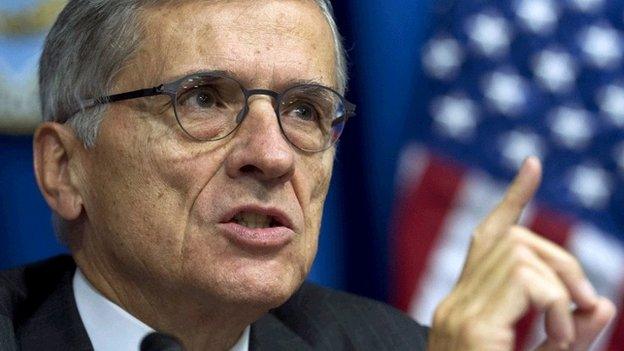
FCC chairman Tom Wheeler intends to reclassify internet service providers as public utilities
FCC chairman Tom Wheeler said he intended to reclassify internet service providers (ISPs) to make them like any other public utility, in order to ensure the watchdog can regulate them.
"These enforceable, bright-line rules will ban paid prioritisation, and the blocking and throttling of lawful content and services," he wrote.
"I propose to fully apply - for the first time ever - those bright-line rules to mobile broadband.
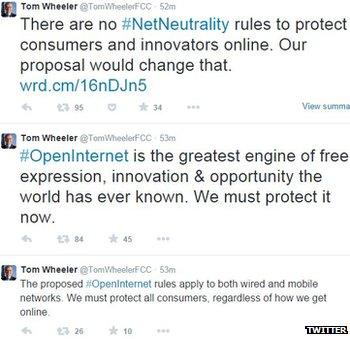
Tom Wheeler tweeted details about his decision
"My proposal assures the rights of internet users to go where they want, when they want, and the rights of innovators to introduce new products without asking anyone's permission."
This will mean far heavier regulation for both fixed line and wireless providers and will give the FCC the power to stop ISPs from blocking traffic from services which rival their own, or from setting up fast lanes for those internet companies prepared to pay.
In a statement to the BBC ahead of the announcement, Verizon refused to be drawn on the debate.
"We have not publicly stated, nor do we intend to speculate, as to what we may or may not do regarding an order that we have not seen and has not yet been approved," it said.
But, in a blog post written a few months ago, entitled Diminishing the Prospects of Further Net Neutrality Litigation, external, the ISP explained the likely course for it and other ISPs if the FCC did reclassify internet access.
"The ISPs, and perhaps some in the tech industry, will have no choice but to fight the sudden reversal of two decades of settled law," it wrote.
ISPs have long argued that, in a data-hungry world, there needs to be some kind of traffic prioritisation.
They point out that bandwidth heavy services such as Netflix are putting disproportionate strain on their networks and forcing them to invest billions in infrastructure. Such services, they argue, should share the costs of maintaining the network.
Obama intervention
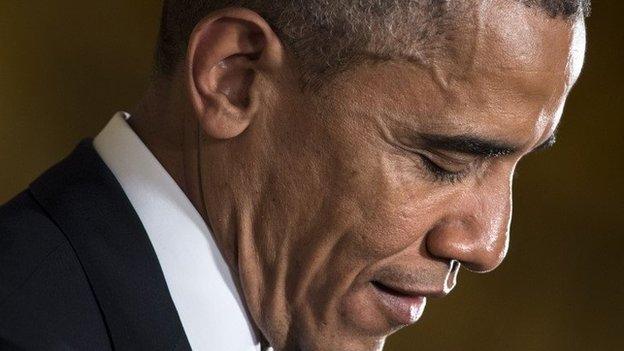
Some believe the FCC's chief only made a U-turn because President Obama had intervened
Verizon kickstarted the current debate about net neutrality when it challenged the FCC's net neutrality rules in January 2014.
A court found in its favour, meaning Verizon could start charging content providers such as Netflix to carry its content through its pipes. It also meant that the FCC had to reassess its rules.
It immediately had two lobby groups putting pressure on it.
Advocates of a free and open internet insisted that net neutrality was one of the fundamental tenets of the internet - it had been built for everybody and it should remain as easy for a small start-up as for a big multi-national to access people via the network, they argued.
ISPs, on the other hand, argued that some sort of traffic prioritisation was necessary in the complex data-hungry world we now live in. Doing so did not damage commitment to an open internet, they contended.
Initially it seemed that the regulator was leaning on the side of the ISPs and favouring some sort of two-tiered internet but protests outside its headquarters, intense lobbying from the tech industry and the eventual intervention of President Obama, appear to have changed its mind.
In November the president waded into the row and called on the FCC to enact "the strongest possible rules" to protect an open internet.
Web founder

Sir Tim-Berners Lee argues that when he created the web it had no special fast lanes
The debate about net neutrality is not just confined to the US.
In Europe some countries, such as the Netherlands, have already enshrined the principle in law.
Web pioneer Sir Tim Berners-Lee called for the rest of Europe to follow suit in a guest blog on the European Commission's website, external, written this week.
The inventor of the world wide web said that maintaining net neutrality was "critical for the future of the web and the future of human rights, innovation and progress in Europe".
"When I designed the web, I deliberately built it as a neutral, creative and collaborative space," he added.
He cited research commissioned by the Dutch government which suggested that net neutrality "stimulates a virtuous circle between more competition, lower prices, higher connectivity and greater innovation".
The European Union is due to discuss the issue of net neutrality in March.
In the US, the changes also have some way to go before they become law.
The five FCC commissioners will vote on the proposal on 26 February.
Meanwhile some reports suggest that a group of Republicans in Congress are already working on a bill to undermine the proposals.
- Published14 May 2014

- Published12 November 2014
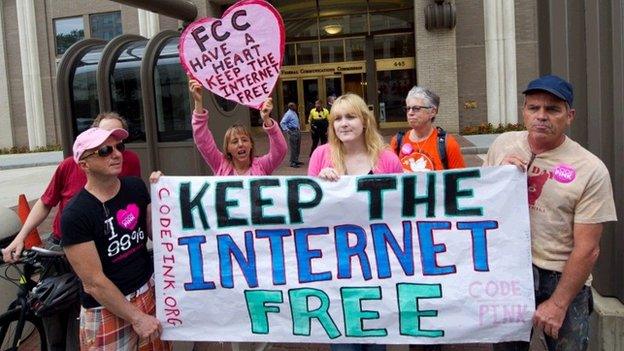
- Published10 November 2014
